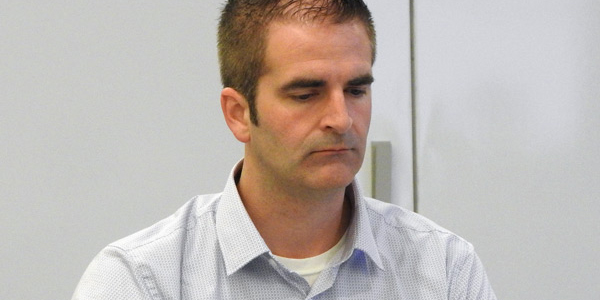At its quarterly meeting Tuesday, NERC’s Operating Reliability Subcommittee decided to cut back its weekly schedule of conference calls focused on the COVID-19 outbreak. Calls planned for this week and May 13 were canceled, and the team agreed to move to biweekly discussions following the next scheduled call on May 20.
ORS Chair Chris Pilong, of PJM, suggested the coronavirus meetings could be scaled back — though not eliminated entirely — because registered entities have largely settled into their pandemic response plans and there are “enough other calls going on between companies that we don’t need to hold the pandemic call” as frequently. Future calls to discuss new developments will be held every other Wednesday at 2 p.m.
GSE Communications Plan Nearing Completion
The group developing communications procedures to be used during a grid security emergency (GSE) is preparing to finalize its recommendations and hand them off to NERC for implementation.

Chris Pilong, PJM | © ERO Insider
The GSE Communications Project was created last year based on the North American Transmission Forum’s (NATF) work implementing the 2015 Federal Power Act, which enables the Energy Secretary to determine if emergency measures are necessary upon presidential declaration of a GSE. Such declarations are available in the case of physical, cyber or electromagnetic pulse attacks or in the case of geomagnetic disturbances. They are not permitted in response to natural disasters.
Efforts by the GSE communications team have focused on leveraging existing communications protocols used to share strategic and long-term goals between the Department of Energy and reliability coordinators (RCs). Their plan is to expand these pathways to share shorter-term operational communications as well, through avenues with which both participants are already familiar.
“We’re trying not to introduce new things,” said Lynna Estep of NATF. “We want to use the RC hotline as much as possible [and] we want to use the RC emergency conference call processes, but just tailor [them] for GSE … We’re not trying to change any of that, we’re just trying to add a layer [to] make sure we have what we need for the DOE to communicate to us during this very specific type of event.”
ORS members asked the development team to make sure their outline provides a realistic role for both the government and RCs. In particular, John Norden of ISO–NE reminded the team to factor in the response time of RCs and not create expectations that they will “turn around and just execute” government instructions. In response, Sam Chanoski, director of threat intelligence for the Electricity Information Sharing and Analysis Center, noted that the development team is “ahead of where the government is” and can hopefully lead the way in setting expectations.
The GSE elements of the Federal Power Act have not yet been exercised, and Estep emphasized that her team is focused on ensuring the grid is not caught unprepared the first time. She pointed to the ongoing pandemic to illustrate the benefits of ensuring preparedness.
“I was on a call earlier today, and as many calls today go, it [went] to COVID-19. And one of the comments made was [that] if we hadn’t had some pandemic plans made ahead of time, then we would have been in a really bad place,” she said. “I see this being the same way … It may not be absolutely perfect, especially because we’re working with some unknowns here, but we need to have something in place.”
ORS, SMS, Could Merge in RSTC Reorganization
The COVID-19 outbreak has complicated the introduction of NERC’s new Reliability and Security Technical Committee (RSTC), but the group still plans to take over the operations of the Planning, Operating and Critical Infrastructure Protection Committees as scheduled in June. The committee’s June 10 meeting, which was planned to take place at NERC headquarters in Atlanta, has now been changed to a webinar in accordance with the organization’s coronavirus response policy. (See “Robb Delivers COVID-19 Update,” Align Tool Set for 2021 Rollout.)
Since its first official meeting in March, the RSTC has been holding weekly conference calls to bring its members up to speed on the work of the retiring committees. (See RSTC Tackles Organization Issues in First Meeting.) Leadership felt this was necessary to ensure that important matters are not lost in the transition to a smaller structure.
“Right now we’re in the process of reviewing the existing subgroup organization and work plans … to ensure continuity from the technical committees to the RSTC,” said Stephen Crutchfield of NERC. “We have a few people on the RSTC that were not on any of the technical committees before, so this is to make sure that they’re aware of things that come up on a routine basis.”
The committee has also been ironing out details of how RSTC meetings will be structured, as well as how to take reports from the existing committees’ various subcommittees and working groups without overwhelming the agenda in routine items.
While most subcommittees are expected to continue their work as usual, reporting directly to the RSTC instead of their previous committees, leaders of the Synchronized Measurement Subcommittee (SMS), presently under the Planning Committee, are currently in talks to merge their group with the ORS. SMS Vice Chair Tim Fritch said the idea was inspired by his group’s recent work helping to analyze outage events, which leadership saw as an indication that it could be more helpful on the operational side than in a planning role.
“It seems like there’s more efficiencies and effectiveness with us being more tied in to the ORS, and we can help more with these events that we’ve seen. We know there will be more coming forward as we have more data and more devices to monitor the system,” he said.




